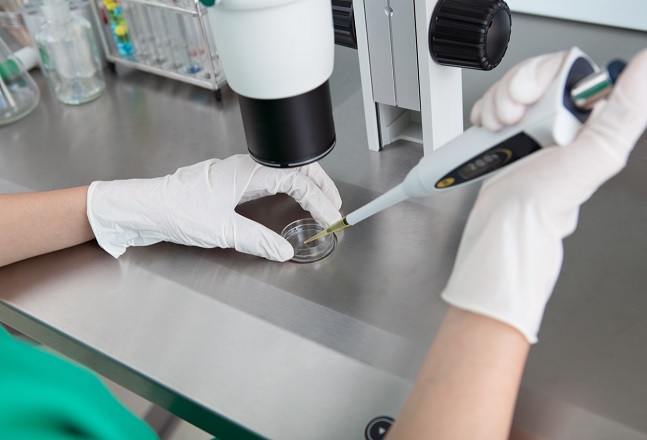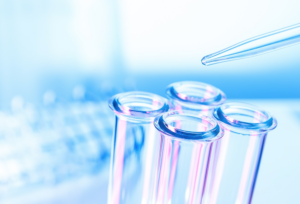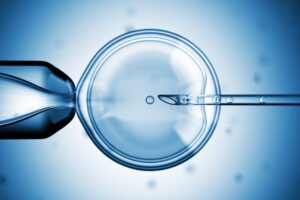Finding Healthy Embryos for Healthy Babies
Most people are familiar with in vitro fertilization these days, but there’s a newer procedure which can be done as a part of IVF which is attracting attention. Preimplantation genetic diagnosis (PGD) involves genetic testing of an embryo before it is transferred to the uterus. This testing can be done for many different genetic diseases in embryos derived from parents who are carriers of specific genetic diseases (eg, cystic fibrosis).

In a related procedure called PGS (preimplantation genetic screening), the embryo can be genetically screened to make sure it has the correct number of chromosomes.
In order for this testing to be done, each embryo must be biopsied (taking one or more cells out for evaluation, either on the third or fifth day of development). In many cases, the embryos must be cryopreserved (frozen) while testing is done, and once the results are obtained, the normal embryo(s) is transferred back in a subsequent cycle. Why are many fertility centers offering PGD and PGS to their patients? When may these procedures be recommended by your reproductive endocrinologist?
Why Chromosomes Matter
An embryo with an abnormal number of chromosomes will usually not be able to implant and develop; that is, you won’t become pregnant. Or the embryo may miscarry very early. Many early miscarriages are due to the random (by chance) occurrence of a chromosomal abnormality in the embryo, according to the American Society for Reproductive Medicine (ASRM.) In fact, ASRM states that 60 percent or more of early miscarriages may be caused by a random chromosomal abnormality, usually a missing or duplicated chromosome. About 25 percent of all recognized pregnancies end in miscarriage. Embryos can be screened for chromosome number, and only normal embryos are transferred back to the uterus.Another reason genetic material matter is the presence of inherited gene mutations resulting in genetic diseases. While these are rare in most populations, some ethnic groups have a higher incidence of certain inherited genetic diseases, such as Tay Sachs, sickle cell disease, or hemophilia. Other couples may have a family history of genetic diseases such as Huntington’s disease or cystic fibrosis. Embryos from these couples can be tested for the gene mutation using PGD and the disease can be avoided in their offspring.
Maternal Age
Patients that are having IVF at age 38 or older may be advised by their fertility specialist to have PGS. As women get older their eggs age as well and become more likely to have chromosomal abnormalities. A high percentage of their eggs may have abnormalities, decreasing the chance of getting pregnant and delivering a healthy baby. After age 40, more than one third of all pregnancies end in miscarriage. PGS enables the embryos fertilized in the lab to be screened so only healthy ones are implanted, improving your chance of getting pregnant and carrying to term.
Testing Embryos for Genetic Diseases
PGD is often recommended when one or both partners are known to be carriers of an inherited genetic disease. For example, if both partners carry the gene for cystic fibrosis, there is a 25 percent chance that their child will have the disease. Genetic testing of their embryos empowers a couple to avoid passing on the disease to their child.
Repeated IVF Failure
Patients of any age who have had three or more failed IVF cycles may be candidates for PGS. Since chromosomal abnormalities are the major reason that embryos don’t grow and implant, preimplantation genetic screening can help determine if an embryo is healthy and increase the chance that a cycle will be successful.
Recurrent Miscarriages
Recurrent pregnancy loss is defined as two or more miscarriages, according to ASRM. If you are 38 or older, the age of your eggs can add to the likelihood of abnormalities. Since the majority of miscarriages are caused by chromosomal abnormalities, PGS can help your fertility doctor make sure the embryo is healthy and decrease your chance of having a miscarriage due to that cause.
Family Balancing
Some fertility centers offer PGD as a way to screen for the sex of the embryo, which allows a couple to select the gender of their potential child by choosing a healthy embryo with the gender they desire. Not every fertility center offers PGD for sex selection purposes.
Cost of PGD
Although costs have come down in recent years, PGD is still expensive technology. The biopsies and tests will run from $4,000 to $9,000 in addition to the other costs of IVF and fertility drugs.
 In a related procedure called PGS (preimplantation genetic screening), the embryo can be genetically screened to make sure it has the correct number of chromosomes.
In order for this testing to be done, each embryo must be biopsied (taking one or more cells out for evaluation, either on the third or fifth day of development). In many cases, the embryos must be cryopreserved (frozen) while testing is done, and once the results are obtained, the normal embryo(s) is transferred back in a subsequent cycle. Why are many fertility centers offering PGD and PGS to their patients? When may these procedures be recommended by your reproductive endocrinologist?
In a related procedure called PGS (preimplantation genetic screening), the embryo can be genetically screened to make sure it has the correct number of chromosomes.
In order for this testing to be done, each embryo must be biopsied (taking one or more cells out for evaluation, either on the third or fifth day of development). In many cases, the embryos must be cryopreserved (frozen) while testing is done, and once the results are obtained, the normal embryo(s) is transferred back in a subsequent cycle. Why are many fertility centers offering PGD and PGS to their patients? When may these procedures be recommended by your reproductive endocrinologist?


